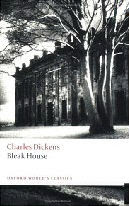Chunkster Challenge #1
Classics Challenge #1
What’s in a Name? 2 Challenge #4
 In the halls of Chancery the suit of Jarndyce vs Jarndyce drags on, no nearer a conclusion than when it was begun. Caught in its paper-choked snares are Chancery wards Richard Carstone and Ada Clare, who are brought to Bleak House by their new guardian, John Jarndyce. Together with Ada’s new companion Esther Summerson, they settle into country life, and Mr Jarndyce begins to entertain rosy hopes for all their futures.
In the halls of Chancery the suit of Jarndyce vs Jarndyce drags on, no nearer a conclusion than when it was begun. Caught in its paper-choked snares are Chancery wards Richard Carstone and Ada Clare, who are brought to Bleak House by their new guardian, John Jarndyce. Together with Ada’s new companion Esther Summerson, they settle into country life, and Mr Jarndyce begins to entertain rosy hopes for all their futures.
In the Lincolnshire countryside, Sir Leicester Dedlock sits in ignorance of his wife’s connection to Jarndyce and Jarndyce. My Lady is too occupied with thoughts of her protegée to worry, until a chance visitor to the neighbourhood shows her how precarious her situation might become. The name of Dedlock is an old and venerable one, and there are some stains it cannot bear.
In London, Sir Leicester’s suspicious solicitor Mr Tulkinghorn has enlisted the aid of Inspector Bucket to make sure that nothing is going to threaten his employer’s reputation. Making enquiries of a homeless waif, a disgruntled maidservant, the landlord of a dead law-writer, and a henpecked stationer among others, the truth is bound to emerge; but whether they will be aided or frustrated by the interference of a lovelorn clerk is another matter. And they are far from being the only people who will be affected by events associated with Jarndyce vs Jarndyce.
I DID IT!!
I did what I had previously thought impossible and made it to the end of a novel by Dickens. (And it only took me, what, two months?) Though definitely long-winded it was far more readable than I had expected, even entertaining, and I think it helped that since my last attempt I’ve read a good bit of Henry James. If you can read his two-page paragraphs, you can read just about anything. And I don’t think high school is a great time to be introduced to Dickens - I’m sure the extra nine years helped as well.
So I was very agreeably surprised by how much I enjoyed the prolix writing and the vast, labyrinthine plot; in fact I was hooked from the start, where I could almost feel the “London particular” swirling around me. There was a Dramatis Personae at the beginning and I needed it to keep track of just who everyone was. The synopsis in the first few paragraphs really is only the beginning. Over the course of the eight hundred-odd pages all the characters and events fitted together beautifully, and I can’t imagine how Dickens kept his ideas organised while he wrote. Another surprise was liking Esther in spite of her excess of perfections. She embodies all the Victorian female virtues with not a single fault, and if in the course of the novel the meek had inherited the earth she should have found herself queen of a vast empire. (A spot of wish-fulfillment of the author’s part perhaps - the ideal woman he didn’t have at home?) She might have become tiresome if she’d narrated the whole thing, but there was enough time spent with other characters to stop that happening. This being Dickens, there's an abundance of eccentrics with names to match who are themselves sufficient motivation to read more of his books; I couldn’t even try to name a favourite. This has been one of the hardest-to-review books I’ve ever read - there’s no clear place to start, and no way of doing so without having to produce a flood of words in order to cover just the most important characters and events. All I can say is that it made me an instant convert to the delights of an author I never thought I’d be able to read.
As much as I enjoyed Dickens’s ways with words (particularly Mrs Pardiggle’s “rapacious benevolence” and John Jarndyce’s coinage of “wiglomeration” to describe the accretion of lawyers around the Chancery suit) it did bog down in places. These were where the subject shifted to Sir Leicester Dedlock’s field - politics. I’m not really fascinated by politics at the best of times, so I had a hard time ploughing through passages about those of half a world away and a century and a half ago. A small fault when weighed against the delights of a novel that covers such a broad cross-section of society, and which has opened up a whole new range of books to me.
And if you’re wary of Dickens and this recommendation isn’t enough to prompt you to pick up Bleak House, I have just three words for you:
Spontaneous. Human. Combustion.
Rating: A-

















I was having a rough time with this at first also, but as soon as the lives started weaving together, I was loving it. Then it had to go back to the library before I was done! Arrgggh! But I'll be getting back to it for certain!
ReplyDeleteLezlie
So when I started reading this review, I was absolutely positive that I wasn't going to read Bleak House. Because of how much I hated Oliver Twist. And then you said the human combustion thing, and now I just don't know! Darn it, my life was so much simpler before I knew about this spontaneous human combustion business!
ReplyDeleteI picked up Bleak House after watching the BBC TV miniseries. The performances of Anna Maxwell Martin (Esther), Gillian Anderson (Lady Dedlock), and Denis Lawson (Jarndyce)plus others are just powerful and affective. I agree with your rating too... it has become one of my all time faves. The miniseries (DVD's) can be the gateway to the book. Thanks for the review.
ReplyDeleteLezlie: Oh no! Isn't it awful when that happens?
ReplyDeleteJenny: Ha! Proof that my evil plan to lure innocent readers into the world of Dickens is working - well, sort of :-)
rippleeffects: I loved the miniseries, too. That's why I chose Bleak House for my latest attempt to read Dickens.
I made this goal to read Dickens this year and I haven't really accomplished it... This reminds me I need to read something so I can feel accomplished!
ReplyDeleteI read three Dicken's novels last year and was surprised to like two of them VERY much. I had always heard he was verbose, but nobody told me how funny he could be. The size of Bleak House is a bit daunting, even for a classic lit lover like myself.
ReplyDelete"Bleak House" is my favorite Dickens novel so far, but "A Tale of Two Cities", "Great Expectations" and "A Christmas Carol" are great also. You should have seen the looks on my family members' faces when I described the scene of the spontaneous combustion! Perhaps I shouldn't have discussed over dinner.
ReplyDeleteKailana: I think there's several months worth of accomplishment here!
ReplyDeleteHopeinbrazil: I love huge books, but I also had my doubts about this one. I was so pleased to discover I'd been worrying for nothing!
Bookwormans: LOL! That sounds like fun . . . I would love to read A Tale of Two Cities; that might be my next foray into Dickens.
Charles Dickens is one of my favorite authors. Having been a precocious child and a bookworm, I read my first Dickens at the tender age of 11. The book was A Tale of Two Cities (I had wanted to read Withering Heights instead but my mom stopped me for some reason. After reading it at the age of 16, I think I knew why). From the very first book I understood one thing, that even though Charles Dickens wrote big (and somewhat) difficult books, if you had it in you to read it to the very end it would be one of the most satisfying reading experiences you would ever have! My favorite Dickens book has to be The Pickwick Papers. Little Dorrit is one of my least favorite Dickens books (one of my older relatives gifted it to me thinking it was a children's book!), but it still is a good read.
ReplyDeleteYou've also mentioned Henry James. I bought his What Maisie Knew at a sale in a second hand book shop. I should have known better having been bored with The Turn of the Screw and never finishing The Aspern Papers. But I thought I would give it another try (besides the books were going so cheap!). I who have read books that are over a 1000 pages long, could not read a mere 268 pages of What Maisie Knew. Since then I've sworn not to read anything Henry James wrote!
"Spontaneous. Human. Combustion."
ReplyDeleteLOVE IT! haha
I love Bleak House, and you gave it a fair review. I am happy ;)